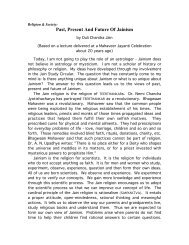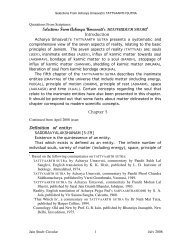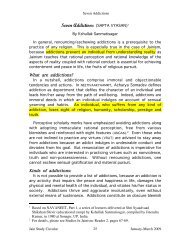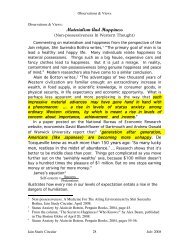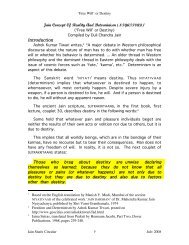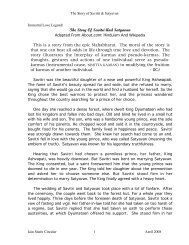Answers To Some Frequently Asked Questions - The Jain Study Circle
Answers To Some Frequently Asked Questions - The Jain Study Circle
Answers To Some Frequently Asked Questions - The Jain Study Circle
You also want an ePaper? Increase the reach of your titles
YUMPU automatically turns print PDFs into web optimized ePapers that Google loves.
<strong>Answers</strong> <strong>To</strong> <strong>Some</strong> <strong>Frequently</strong> <strong>Asked</strong> <strong>Questions</strong>(Reprinted from ‘Religious Ethics: A Sourcebook’, edited by Dr. Arthur B. Dobrin,published by Hindi Granth Karyalaya, Mumbai, 2004.)(Continued from July 2005 Issue)by Duli Chandra <strong>Jain</strong>33. Is the theory of evolution compatible with your religion?<strong>Jain</strong> scriptures say that the universe is continuously evolving according to the laws ofnature and the attributes of the entities such as souls, matter and energy, space and time.Further, according to <strong>Jain</strong>ism, the absolute truth comprising the nature of reality existsbut we can know it only partially. Thus it is not possible for us to ascertain Darwin'stheory of evolution. It should be pointed out that the theory of evolution and many otherscientific concepts are not relevant to the practice of our code of ethics.34. Are environmental concerns part of your religious ethic?<strong>The</strong> <strong>Jain</strong> scriptures enumerate the functions of the various entities of the universe.TATTVAARTH SUTRA states that the function of living beings is to help each other(PARASPAROPAGRAHO JEEVAANAAM). Thus all living beings of the universe areinterdependent. Thus we must protect our environment for our own survival and for thesustenance of all other living beings. <strong>The</strong> code of ethics entails that we minimize ourpassions, especially greed, avoid exploitation of others, and practice non-possessiveness.Thus conservation of natural resources and preservation of environment is an importantaspect of <strong>Jain</strong>ism. A layman learns t is important lesson by practicingANARTHADAND VRAT - the augmenting vow of limiting needless activities.35. Do animals have any moral standing?In <strong>Jain</strong>ism, one of the attributes of soul is consciousness. <strong>The</strong> consciousness of worldlysouls is obscured to various degrees by the blanket of karmic matter. Accordingly,animals do possess cognitive faculty (UPAYOGA) and thinking facility (MANAH). It isobserved that animals learn activities such as picking their food, looking for shelter andprotecting themselves. <strong>The</strong>y can be trained to perform a variety of acts and they do notattack their trainers and handlers. Thus they exhibit some discrimination. As anextension of these facts, depending on their mental development, different animals mayconceivably have some moral standing.36. Does your religion predict an end of time? If so, when will that be and what will theworld be like for humans?<strong>Jain</strong> religion believes that all entities of the universe are eternal. Time is one of the sixentities in the universe. Thus time is eternal. <strong>The</strong> universe does undergo ascending anddescending cycles like crests and troughs of waves. During an ascending cycle, the levelof morals in society and the state of peace and harmony in society increases while duringthe descending cycle, the opposite happens.37. Is sex outside marriage permissible?38. Is sex only for procreation?39. Is masturbation allowed?
46. Is it immoral to have more than one spouse at a time?<strong>The</strong> virtue of purity of body and mind (BRAHMACHARYA) entails setting limits asindicated above. Thus obviously, having only one spouse at a time is highly desirable inthe practice of partial celibacy for householders. <strong>Jain</strong>s monks observe total celibacy andso the question of multiple partners does not arise in their case. It should be remarkedthat having multiple spouses is bound to lead to problems, conflicts and passionatearguments, which comprise mental violence and may lead to physical violence as well.<strong>Jain</strong>s should refrain from such situations that have potential for violence.47. Is divorce acceptable?<strong>Jain</strong>s are expected to develop a rational view of reality. We should realize that all arehuman with all kinds of strengths and weaknesses, virtues and shortcomings. <strong>The</strong> self isno exception to these verities. Further, divorce entails serious violence of feelings andthoughts, even if children are not involved. Thus divorce and the situations leading todivorce should be avoided at all cost in view of the <strong>Jain</strong> practice of the virtue ofnonviolence. Our belief in reality also tells us to accept reality. Divorces do occur,mostly in the heat of passions and we have to treat such cases as any other aspect ofreality.48. Are the roles played by men and women a moral issue?<strong>The</strong> <strong>Jain</strong> code of ethics comprising of the five virtues of nonviolence (AHIMSA), truth(SATYA), non-stealing (ACHAURYA), purity of body and mind (BRAHMACHARYA)and non-possessiveness (APARIGRAH) is the same for men and women. Both men andwomen are supposed to play their common roles of helping each other, working for thecommon welfare of all humanity, and protecting the environment. Each is responsiblefor his/her moral conduct.49. Are men and women separate but equal?Reality is that there are certain inherent differences between males and females, man andwomen. For example, mothers give birth, and the two parents have somewhat differentinstincts toward their children, and in general, play somewhat different roles in raisingthem. Nevertheless, the two are equal in the eyes of <strong>Jain</strong>ism for the concerns of welfareof their children and the roles played by them are equally important. Due to presentcircumstances, these roles are changing to some extent, but this does not change view of<strong>Jain</strong>ism regarding their equality.50. Is the use of drugs and/or alcohol allowable?Alcohol is known to suppress one's inhibitions. Drugs and alcohol impair an individual'sability to discriminate between good and bad, right and wrong, propriety and indecorum.<strong>The</strong>y generate numerous problems and conflicts among people. This amounts to selfdirectedmental violence. It contributes to physical violence of self and of others. Drugsand alcohol are addictive - one becomes dependent on them and loses one's discretionand independence. <strong>Jain</strong>s believe in supremacy of nonviolence so they are expected tostay away from these substances.51. Should prayers be allowed in public schools?
In a society based on the principle of separation of church and state, there is no room forprayer in public schools. Supporting such practices in the name of promoting moralvalues, ethical conduct and sense of patriotism sends a wrong message because no prayeris divorced from some religious tenets.52. Should the state subsidize religious schools or programs?How can a secular state subsidize religious schools or programs? This will only createcompetition for recognition, ill will and conflicts among various sections of society.Church and state should remain in separate spheres.53. Is the food a person eats a religious and/or moral concern?Almost all religions place some restrictions on food and diet. In view of the virtue ofnonviolence, <strong>Jain</strong>ism teaches vegetarianism. It is good for our mental and physicalhealth. A non-vegetarian diet entails killing of animals while growing grains, fruits andvegetables involves less violence. It is also good for the environment because productionof animals foods requires more natural resources than production of vegetarian foods.54. Is gambling allowed?Gambling involves greed and it is addictive. In many instances, it leads to personal andfamily problems and ruins the well-being of one's family. <strong>Jain</strong>ism teaches us to avoid thesituations that may lead to problems and violence of any kind.55. Is smoking allowed?Smoking is not good for ones health. It is addictive. Thus it is self-directed violence. A<strong>Jain</strong> is expected to refrain from such activities. In fact, the <strong>Jain</strong> scriptures teach thehouseholders not to indulge in businesses and enterprises that involve the sale orpromotion of smoking, gambling, alcohol, drugs, pornography and other instruments ofmental and physical violence.



